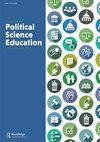课堂中的选举政治:对模拟人物社会学的思考
IF 0.6
Q3 POLITICAL SCIENCE
引用次数: 0
摘要
本文章由计算机程序翻译,如有差异,请以英文原文为准。
Electoral Politics in the Classroom: Reflections on the Sociology of Simulated Characters
Abstract Simulations have become a staple of political science education due to their effectiveness and creative nature that contributes to learning success. In this contribution, we argue that simulations can also offer new insights not only into student engagement and active learning, but also into the sociology of political processes. In this case it is a political communication seminar, that included a simulation of presidential campaigns and an election in a fictionalized setting. This article shows that in a classroom setting the students are prone to reproduce existing electoral leanings and behavior. In the proposed simulation of elections in a fictional country of Genovia, the students naturally aligned around two candidates: a right-wing populist and an environmental activist who ultimately lost the elections. This article offers several insights into an online simulation format and breaks down the sociology of the surprisingly realistic representation of a Euro-American electorate.
求助全文
通过发布文献求助,成功后即可免费获取论文全文。
去求助
来源期刊

Journal of Political Science Education
POLITICAL SCIENCE-
CiteScore
1.80
自引率
36.40%
发文量
69
期刊介绍:
The Journal of Political Science Education is an intellectually rigorous, path-breaking, agenda-setting journal that publishes the highest quality scholarship on teaching and pedagogical issues in political science. The journal aims to represent the full range of questions, issues and approaches regarding political science education, including teaching-related issues, methods and techniques, learning/teaching activities and devices, educational assessment in political science, graduate education, and curriculum development. In particular, the journal''s Editors welcome studies that reflect the scholarship of teaching and learning, or works that would be informative and/or of practical use to the readers of the Journal of Political Science Education , and address topics in an empirical way, making use of the techniques that political scientists use in their own substantive research.
 求助内容:
求助内容: 应助结果提醒方式:
应助结果提醒方式:


